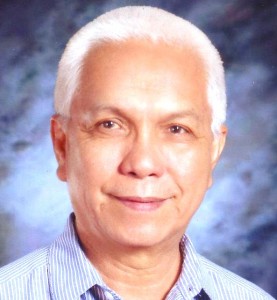DAVAO CITY—Leoncio Evasco Jr., the mayor of Maribojoc town in Bohol province who was on the news for stopping the Red Cross from distributing goods in his earthquake-ravaged town, is best remembered here as the ex-rebel priest who became one of the most trusted strategists of tough-talking Mayor Rodrigo Duterte.
In fact it was this closeness that prompted Duterte to personally hand over P1 million in aid to Evasco for the relief efforts in Maribojoc. The amount is part of the P6 million in aid the city government sent to quake survivors in Cebu and Bohol.
Estela Ma. Labor, a former colleague at the City Hall, where Evasco worked as the chief of staff of then newly elected Mayor Duterte in 1988, described the Maribojoc mayor as a man with a high level of management skills.
He was the head of the city’s economic enterprises office and the city engineer’s office before becoming Duterte’s alter ego.
Labor said even if Evasco was not an engineer, he surprisingly commanded high respect from employees of the city engineer’s office.
The city engineer’s office was the last unit under Duterte’s office that Evasco headed before resigning to join Maribojoc politics in 2007.
Evasco was a priest when he joined the underground movement in the 1970s.
Organizing skills honed
He used to say that his nine years in the underground movement honed and polished his management and organizing skills.
Evasco, who grew up in Bohol, was ordained a priest in 1970 and was assigned to the parishes of Baclayon, Dauis and Catigbian.
A raid on his convent in Catigbian by soldiers in 1974 pushed him to join the underground Communist Party of the Philippines and its armed wing, the New People’s Army, he said.
In 1983, his underground years were abruptly cut when after almost a decade, he was caught while presiding over the wedding of a comrade in Midsayap, North Cotabato province. Four of his comrades, who were arrested with him, were summarily executed.
Heavily tortured
Beth Ancheta, a fellow detainee, recounted that among the suspected communists imprisoned in the same detention center she was brought in, Evasco was heavily tortured because he was identified as a high-ranking communist leader.
Evasco came face-to-face with Duterte during the trial of the case against him for being an alleged communist rebel. Duterte was then a government prosecutor based in this city.
When the dictator Ferdinand Marcos was ousted following the 1986 Edsa People Power Revolution, Evasco was among the political detainees whom then President Cory Aquino ordered released from jail.
Campaign manager
Shortly after his release, Evasco found work as the secretary general of Samahan ng Ex-Detainees Laban sa Detensyon at Aresto while Duterte served as acting vice mayor.
When Duterte ran in the 1988 mayoral elections, Evasco served as his campaign manager.
Duterte appointed him head of the city engineer’s office and then of the economic enterprise office before eventually making him his chief of staff, or what is widely known as the little mayor’s position.
Contacted on the phone by the Inquirer after drawing criticisms for stopping a team of the Philippine Red Cross (PRC) from distributing goods in his town following the 7.2-magnitude earthquake that ravaged Bohol and Cebu, Evasco said that he merely wanted a systematic and well-organized distribution, “to reach everyone in need and avoid replication.”
The motorcycle-riding mayor, married with children and grandchildren, said he feared there would be uneven distribution when told the PRC was not coursing its assistance through the local government units because it was an apolitical organization.
PRC head a politician
“How can they be apolitical when the one at their helm is a politician?” he asked, referring to former Sen. Richard Gordon, whom he said arrived the following day to enjoy all the photo ops.
Labor, secretary of the city engineer’s office, said she was surprised by Evasco’s brush with the PRC because she knew him to be an advocate of workable systems at City Hall.
“Under his management, [transactions were speedier]. He also eliminated delays caused by the padrino system,” Labor said.
X-factor
“Of course, it’s not good to compare [him] with my former bosses because they were also good in their own right. (Former city engineer) Meinrando Metran was very knowledgeable technically because he was a civil engineer, but I was simply amazed that LBE (Evasco’s initials the rank and file used to call him), who was not an engineer, had the X-factor,” said Labor, herself a civil engineer.
“He has that aura that commands respect,” said Labor, who admitted she also thought at first that Evasco would not be able to head the city engineer’s office that well but quickly changed her mind.
It was Evasco who separated the office of the building official from the city engineer’s office to smoothen and streamline operations to speed up the processing of documents.
She also said it was during Evasco’s time when he allowed a division head to control his or her own office. “They (heads) felt better because they were respected and were [allowed] to run their respective offices. He was only there to supervise.”
